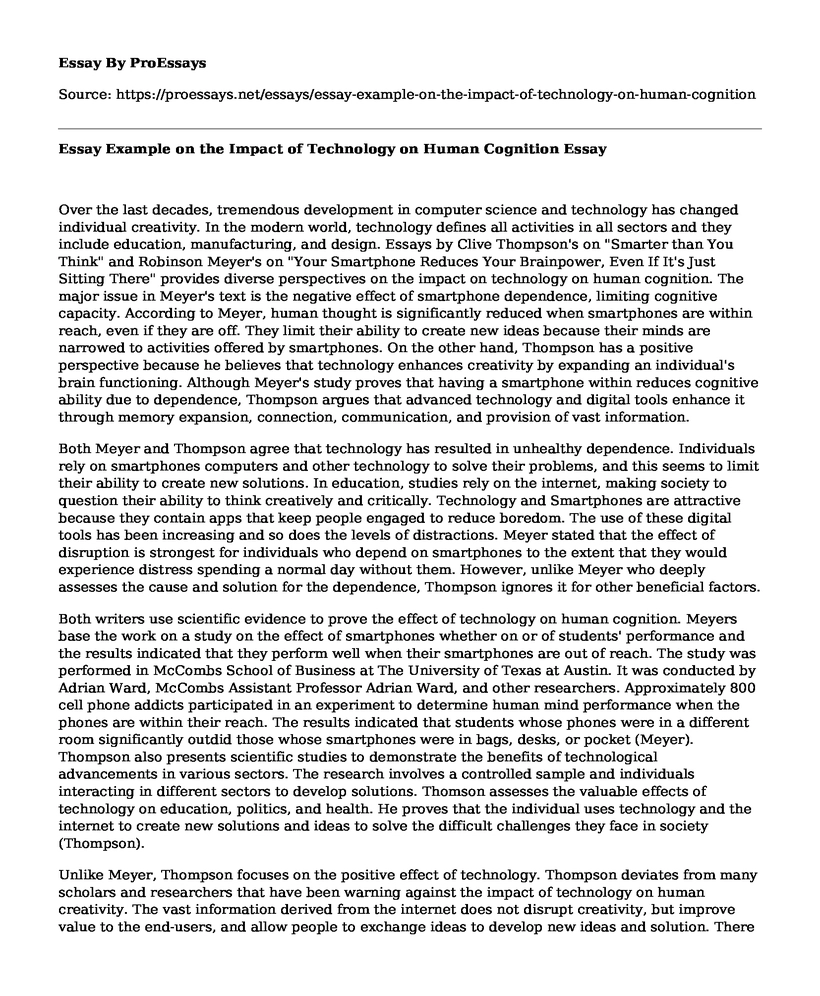Over the last decades, tremendous development in computer science and technology has changed individual creativity. In the modern world, technology defines all activities in all sectors and they include education, manufacturing, and design. Essays by Clive Thompson's on "Smarter than You Think" and Robinson Meyer's on "Your Smartphone Reduces Your Brainpower, Even If It's Just Sitting There" provides diverse perspectives on the impact on technology on human cognition. The major issue in Meyer's text is the negative effect of smartphone dependence, limiting cognitive capacity. According to Meyer, human thought is significantly reduced when smartphones are within reach, even if they are off. They limit their ability to create new ideas because their minds are narrowed to activities offered by smartphones. On the other hand, Thompson has a positive perspective because he believes that technology enhances creativity by expanding an individual's brain functioning. Although Meyer's study proves that having a smartphone within reduces cognitive ability due to dependence, Thompson argues that advanced technology and digital tools enhance it through memory expansion, connection, communication, and provision of vast information.
Both Meyer and Thompson agree that technology has resulted in unhealthy dependence. Individuals rely on smartphones computers and other technology to solve their problems, and this seems to limit their ability to create new solutions. In education, studies rely on the internet, making society to question their ability to think creatively and critically. Technology and Smartphones are attractive because they contain apps that keep people engaged to reduce boredom. The use of these digital tools has been increasing and so does the levels of distractions. Meyer stated that the effect of disruption is strongest for individuals who depend on smartphones to the extent that they would experience distress spending a normal day without them. However, unlike Meyer who deeply assesses the cause and solution for the dependence, Thompson ignores it for other beneficial factors.
Both writers use scientific evidence to prove the effect of technology on human cognition. Meyers base the work on a study on the effect of smartphones whether on or of students' performance and the results indicated that they perform well when their smartphones are out of reach. The study was performed in McCombs School of Business at The University of Texas at Austin. It was conducted by Adrian Ward, McCombs Assistant Professor Adrian Ward, and other researchers. Approximately 800 cell phone addicts participated in an experiment to determine human mind performance when the phones are within their reach. The results indicated that students whose phones were in a different room significantly outdid those whose smartphones were in bags, desks, or pocket (Meyer). Thompson also presents scientific studies to demonstrate the benefits of technological advancements in various sectors. The research involves a controlled sample and individuals interacting in different sectors to develop solutions. Thomson assesses the valuable effects of technology on education, politics, and health. He proves that the individual uses technology and the internet to create new solutions and ideas to solve the difficult challenges they face in society (Thompson).
Unlike Meyer, Thompson focuses on the positive effect of technology. Thompson deviates from many scholars and researchers that have been warning against the impact of technology on human creativity. The vast information derived from the internet does not disrupt creativity, but improve value to the end-users, and allow people to exchange ideas to develop new ideas and solution. There are different types of applications that provide information in a crowdsourcing way. Meyer argues that new technology has improved in the healthcare workforce (18). Advances in cloud computing, mathematics, and computing power have enhanced healthcare employees' ability to analyze, interpret, and decision making through the utilization of artificial intelligence.
Meyer argues that individuals shout to keep smartphones away from reach to enhance their human thought. Thompson holds that social media and other internet platforms pray significant roles in individuals' lives because it allows them to share, synthesize, aggregate, compare, and store information from various sources for the formation of a new meta-knowledge. Thompson contracts Meyer's beliefs by confirming that the use of social media is not a waste of time because it allows people to brainstorm and develop solutions to their problems. Smartphones and exposure to modern technology do not reduce the human ability to reason as Meyer suggests. On the contrary, Thompson states that technology improves human critical thinking because the brain has the ability to develop and adjust to new problems. The use of smartphones and modern technology depends on personal cognitive ability, hence it cannot reduce it.
Conclusion
In conclusion, the two writers focus on the impact of technology on human cognition. Meyer portrays a dark picture where society is overwhelmed by the addition of smartphones. He recommends that people should keep their phones away because they reduce their ability to reason. On the other hand, Thompson focuses on the positive effects of the internet and technology. Although he recognizes the problem of dependence and addiction, he finds no significant evidence that technology limits human though. He offers a reasonable solution by urging people to balance their use of digital tools.
Works Cited
Meyer, Robinson. "Your Smartphone Reduces Your Brainpower, Even If It's Just Sitting There." The Atlantic (2017).Thompson, Clive. Smarter than you think: How technology is changing our minds for the better. Penguin, 2013.
Cite this page
Essay Example on the Impact of Technology on Human Cognition. (2023, Jul 02). Retrieved from https://proessays.net/essays/essay-example-on-the-impact-of-technology-on-human-cognition
If you are the original author of this essay and no longer wish to have it published on the ProEssays website, please click below to request its removal:
- Why High Schools Should Look To Implement A Smartphone Ban? - Essay Sample
- Interdisciplinary Collaboration to Select a Clinical Measure
- Renewable Energy Funding Essay Example
- Determining Personal Truth Essay Example
- Paper Example on Case Manager & Client: Achieving Mental Health Goals Together
- Essay on SEL Standards: Turning Teachers Into Therapists and Students Into Patients?
- The Captivating Aliyah: A Patient From Dallas in New York - Report Example







